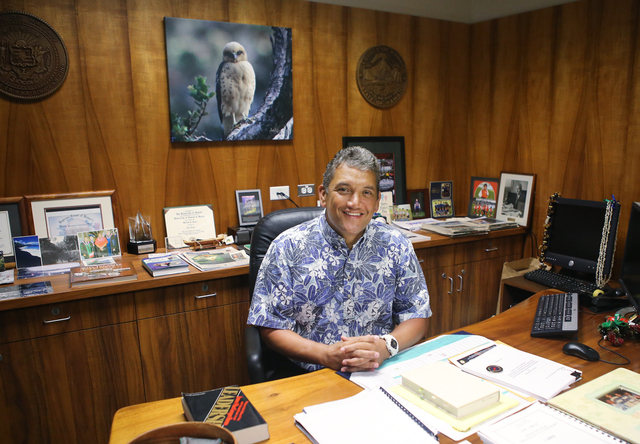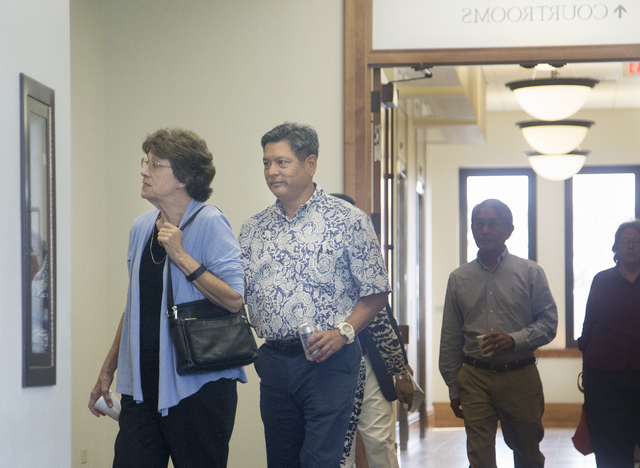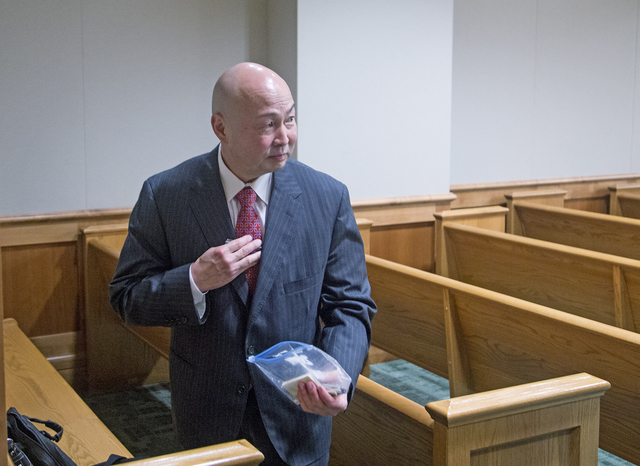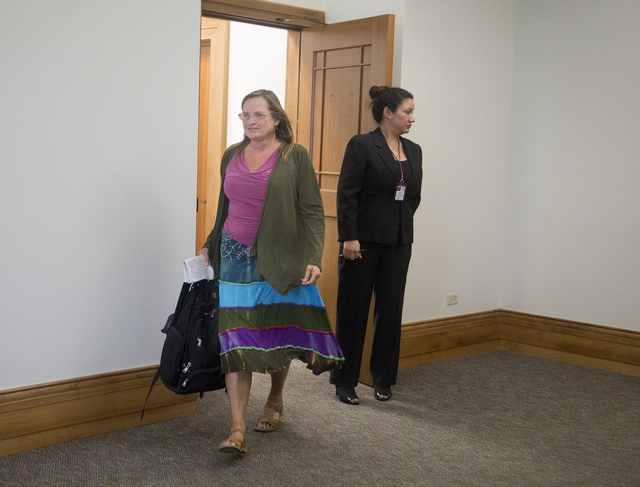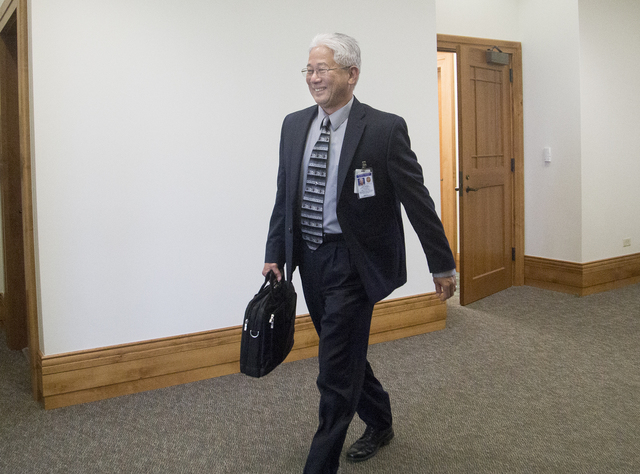Attorney: Kenoi won’t resign following indictment
An attorney for Mayor Billy Kenoi said the county’s embattled chief executive won’t resign.
ADVERTISING
A Hilo grand jury on Wednesday indicted Kenoi with two counts of second-degree theft, two counts of third-degree theft, three counts of tampering with a government record, plus making a false statement under oath.
Second-degree theft, the most severe charge, is a Class C felony punishable by up to five years in prison and a $10,000 fine.
“The county is not out one penny. Mayor Kenoi has not enriched himself one penny,” Honolulu attorney Todd Eddins said late Wednesday. “It is factually and legally feeble to claim that Billy Kenoi stole from his hometown.”
The charges are the result of an investigation into Kenoi’s alleged misuse of his county credit card, also known as a pCard.
“The Department of the Attorney General sought this indictment after an intensive investigation that lasted almost a year,” Attorney General Doug Chin said in a written statement. “I thank the investigators and prosecutors for their efforts.”
Under Hawaii law, second-degree theft is misappropriation of money or property of at least $300 and less than $20,000. Third-degree theft is misappropriation of money or property of at least $100 and less than $300.
The alleged amounts are not specified in the indictment, but one felony theft charge covers purchases between May 11, 2011, and Oct. 11, 2011, and the other between Jan. 17, 2013, and June 28, 2013.
The misdemeanor thefts allegedly took place June 30, 2014, and Nov. 16, 2014.
The records tampering charges stem from three entries Kenoi made on county pCard transaction summaries.
Kenoi is accused of falsely describing a purchase at the Hilo Yacht Club as an “office strategic planning luncheon,” a purchase at a Longs Drugs store “as being for Sam Choy’s Poke Contest Volunteer Appreciation Event,” and a purchase at Volcano House Restaurant as a “luncheon with U.S. Conference of Mayors visitors.”
The purchases occurred in October 2011, March 2013 and June 2014.
The indictment also states that on Feb. 6, 2015, Kenoi intentionally made a false statement under oath, but doesn’t say what the statement was.
The Attorney General’s Office began investigating Kenoi’s pCard use in April 2015 after Big Island newspapers reported Kenoi had used his pCard at a Honolulu hostess bar.
The mayor racked up more than $120,000 in charges on the card by then, including $892 at hostess bar Club Evergreen, $1,219.69 for a surfboard, and a $700 tab at a Hilo karaoke bar. He also spent $400 at another Honolulu hostess bar, the Camelot Restaurant and Lounge.
Kenoi reimbursed the county for $22,292 in charges between January 2009 and March 2015. He later paid back an additional $7,503.
The county restricted access to his pCard records by providing only summaries of charges, rather than the actual documents, in response to records requests from West Hawaii Today reporter Nancy Cook Lauer. She uncovered the Club Evergeen charge after obtaining a pCard document from an alternate source.
The county issued its own pCard audit last July that found 145 pCard transactions totaling $23,683 in the Mayor’s Office didn’t follow county policy, had a questionable public purpose or might have violated state law. That included $3,689 in charges deemed personal.
Eddins maintained “everything was transparent.”
“Nothing was hidden,” he said. “Each expense by the mayor served a public purpose, or in black-and-white was described as an expense to be reimbursed. And it was.”
Representatives of several news media outlets, including the Tribune-Herald, stationed themselves Wednesday in the hallway outside the grand jury room at the Hilo courthouse before and during the proceedings, which are held in secret.
Deputy Attorney General Kevin Takata presented the case before the grand jury.
Kenoi didn’t testify, but current and former county executives did, including Managing Director Randy Kurohara, who previously oversaw pCard use for the Mayor’s Office, and former Finance Director Nancy Crawford.
Other testifiers included Dan Hanagami, who spearheaded the investigation for the Attorney General’s Office, and Cook Lauer.
“My appearance today before the grand jury was the culmination of a more than five years’ battle to acquire county pCard records that are public documents under state law,” Cook Lauer said afterward. “While grand jury proceedings are confidential, I can say I appreciate the jury’s dedication in reinforcing the message that the use of the public’s money is the public’s business.”
Melody Parker, a county deputy corporation counsel, escorted the county officials and employees who testified in and out of the grand jury room. Before proceedings began, Parker attempted to prevent photography of county officials in the courthouse hallway.
“I’m going to ask you nicely to remove the cameras and not take any pictures of the grand jury or the county officials who are going to testify,” Parker said.
Photographing witnesses outside a courtroom or grand jury room is allowed under state law, and the media continued to take photographs of witnesses. Photographing jurors is prohibited.
Harry Kim, the former mayor who hired Kenoi as an executive assistant — and who is running for mayor again this year — said the news was a lot to take in.
“I got to swallow this,” said Kim, who coached Kenoi when he played football for Waiakea High School.
“It doesn’t feel good in regards to why we are here.”
But Kim, whose administration instituted pCards in 2003, said he has faith in the judicial process to do what is right.
“If I trust the process, then it must have been the right thing for the process to do,” he said.
Kenoi did not return calls made to his office and to his cellphone by press time Wednesday, but he gave his annual speech to the Japanese Chamber of Commerce and Industry of Hawaii as the proceedings occurred.
“I would never disrespect our county, disrespect you by taking anything. In our county, our administration, I ask everybody to give,” Kenoi said in a video of that speech posted on the Big Island Video News website.
“Everyone is held accountable every week,” said Kenoi, who is serving his second term and can’t run for re-election this year.
When asked about Kenoi’s political future, Todd Belt, a political science professor at the University of Hawaii at Hilo, told the Tribune-Herald, “You can indict a ham sandwich.”
“In other words, it’s pretty easy to get an indictment, but then it moves to the real court case,” Belt said. “Past history shows that the mayor is a fighter. I fully expect he will fight these charges. The outcome of this case is what matters to his political career.”
Email John Burnett at jburnett@hawaiitribune-herald.com.
Email Tom Callis at tcallis@hawaiitribune-herald.com.


